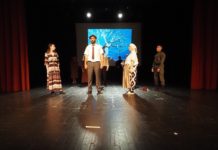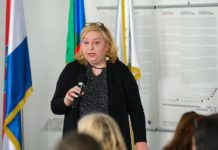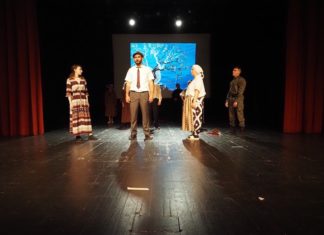In order to meet the standards of acceptance and integration of refugees to which Croatia has committed as a member of the European Union, the cooperation of various stakeholders at the local and national levels is necessary. Those working in the Center for Cultural Dialogue, which operates as part of the Islamic Community in Croatia, and whose mission is to strategically strengthen and promote interreligious and intercultural dialogue, know this perfectly. Its executive director, Nejra Kadić Meškić, describes her job as extremely interesting, demanding, and challenging, while frequent business trips give her the opportunity to meet different people, and emphasize her religious and activist identity.
At one gathering abroad, I received a comment that I speak a lot for a Muslim woman, given that I do not hesitate to speak publicly, she states and continues: It is certainly possible to reconcile the social position of women with religious self-determination and challenges of modern life. I am an autochthonous European Muslim woman and I need to emphasize this to participate in changing the perception and narrative about Muslims, especially about Muslim women.
Kadić Meškić closely ties her Muslim identity to labeling herself as a feminist. In her work, both in Sarajevo, where she moved from, and in Zagreb, she saw that most people are either not familiar with the concept of feminism, its history, and its layers, or perceive it very negatively. I think that when someone says that they are not a feminist, this actually represents just a misunderstanding of the term, whose perception leans towards radical feminism. Feminism is for everyone. The very migrations to Europe have shown us the different struggles of women and the intellectual debates in which they demand the realization of their rights in new environments.
She finds equal partners on these topics among male officials in the Islamic community in Croatia, precisely because of the scope of their theological knowledge. She adds: There is a lot of space for raising awareness in the community but also for institutional progressiveness which should come from the Islamic community itself – through the adoption of certain policies and through the establishment of a body that would deal precisely with the equality and empowerment of women.
The Center for Cultural Dialogue organizes the Youth School of Leadership and Dialogue, in which Kadić Meškić finds, as she states, a chance to work with young people, most effectively through the horizontal integration of gender equality within all educational units, starting with female leadership. The perception of feminism among young people is also an idea that they hesitate to deal with. The topics that arise during such discussions are mainly reduced to the issues of polygamy in Islam or the interpretation of regulations on a husband disciplining his wife, for which they often seek answers on the Internet and form their opinions through information whose sources are sometimes questionable and irrelevant.
I can say that among young Muslim women, and some are graduates of Islamic High School, I have met very bright and sharp feminist minds who do not want to fit into the typical patriarchal image of society but want to be agents of change, emancipated and active citizens in Croatian society. On the other hand, some women choose to stay at home after finishing school and take care of the children and the household, which is perfectly fine if this is truly their choice and not an adjustment to the expectations of the community. Expectations should not be gender-specific but adapted to personal interests, talents, and experiences.
That is why the examples of women who have made their own decisions in choosing a profession and professional development are important for Kadić Meškić, who believes that such women should be more visible in order to share their experiences and practices. She emphasizes that synergistic action at the local and regional level is very important in achieving real change regarding gender equality and other social processes, and mentions the Islamic community as an umbrella that could carry out these processes as part of a platform for greater inclusion of women in the discussion of important issues. In that case, we are talking about an institutional set-up where it would be possible to work directly with both men and women and especially with young people who are the true bearers of change. Communication and dialogue are key in promoting ideas, of feminism and Islam, respectively.
Double discriminated (at least)
Although not necessarily within a religious context, Kadić Meškić was actively involved in gender equality actions in Sarajevo, where she and her colleagues created a series of strategic documents related to improving the implementation of human rights, and in 2013 she received an award from the Parliamentary Assembly of Bosnia and Herzegovina for her contribution to gender equality. The Center for Cultural Dialogue invests a lot in projects involving the integration of persons under international protection in Croatian society, within which the themes of reshaping the narrative about refugees and the integration of refugee women stand out as important. On last year’s World Refugee Day, a panel was organized, dedicated to the experience of women in migrations. Integration must take place, not assimilation. The Islamic community in Croatia has an important role in integration because it has its hundred-year tradition of successfully functioning as a minority community in a more homogeneous majority.
Ruba Naddaf, a girl from Syria, currently residing in Sisak, spent almost half of her life in a refugee camp in Turkey. She has been living in Croatia for the last three years, and she cites learning the Croatian language as the most important step towards integration, thanks to which she enrolled in the professional study program in nursing in Zagreb. It was important for me to remain true to myself, and never take off the headscarf which is a part of me, no matter where I am. When I spend time with Muslim women here, I feel at home, like I am not a foreigner. I have both male and female friends, of various religions. I like Croatia and I feel safe here.
Kadić Meškić cites the people she works daily with, to whom she is at her disposal, as her greatest inspiration. These are persons under international protection, such as Ruba Naddaf, asylum seekers, and persons under subsidiary protection, from numerous countries – Afghanistan, Iran, Iraq, Turkey, Syria, and various African countries, and who come from different cultural contexts and, above all, do not speak the Croatian language. They are a great reminder of those true values in life and even though they are challenging to work with because of all the things that may not contribute to integration, you experience their successes as your own.
According to UNFPA data (2018), almost half of all migrants are women and girls, so although they face great risks such as sexual exploitation, human trafficking, and violence, their experiences are often equated with those of men. They do not stop getting pregnant while they are on the move, and there is a greater possibility that they will face health problems, both in transit and the country of destination. Thus, they are discriminated against twice – as women and as migrants. The EU’s Action Plan on Integration and Inclusion 2021-2027 recognizes that when women arrive in Europe to join a family member, they likely bring with them domestic responsibilities that may prevent them from fully participating in the labor market and in integration programs, skills assessments, retraining, and other measures. The additional challenges they face are certainly caused by a weaker knowledge of the language of their host country, less frequent exposure to social interaction, and greater responsibility in caring for children and the family.
Arda Kaan, who wanted her identity to remain hidden, arrived in Croatia in 2018 when she requested asylum due to the political situation in Turkey. Although she had a degree in psychology, she decided to transfer to the IT sector. She currently works as a software quality engineer in Zagreb and makes a decent living. Although without a single bad experience at her work, Arda Kaan states that the situation is different when she goes out on the street – people make jokes and comment that this is not her country, and sometimes they directly address her on public transport or in a store. Being a woman is hard everywhere, but I am strong enough to deal with it. My hijab is my identity, and I carry it with me. It represents not only myself, but also my religion, my values, and my beliefs. I also support other women in their right to equality, as long as they do not openly criticize Islam and the Qur’an. Women are important in Islam and I know my place in society.
The research that Kadić Meškić worked on as part of the European Islamophobia Report confirms the absence of systematic Islamophobia in Croatia. Hate speech is more common than hate crimes, usually linked to statements by individuals who cannot be associated with a specific group. There is one section of the Report that talks about migrants and refugees, and this is where hate speech is much more common. This is not only a matter of religion, but also has to do with the culture, style, way of life, values, practices, and customs of asylum seekers, which are unknown to Croatian society. Suspicion towards Muslim refugees is somewhat greater but is not exclusively based on their religion.
Stories about the successful integration of refugees who enjoy international protection are often lacking from the media and public space, giving way to dissenting narratives, without paying much attention to the suffering of individuals and the global and historical context of their migration. Thus, condemnation and misunderstanding should be replaced by intercultural dialogue, especially when it comes to women who are often expected to embody all the reminiscences of their country of origin, which includes housework. For the benefit of women, but ultimately the community as a whole, preventing their isolation is certainly a significant task. When I ask Kadić Meškić why this is important to her, she answers: Probably because I feel a huge responsibility, starting with the fact that I am a woman. Bonding, support, and solidarity remain such important tools in the process of integration, but also of the general positioning in society.
The publication of this text was supported by the Electronic Media Agency as part of the program to encourage journalistic excellence












